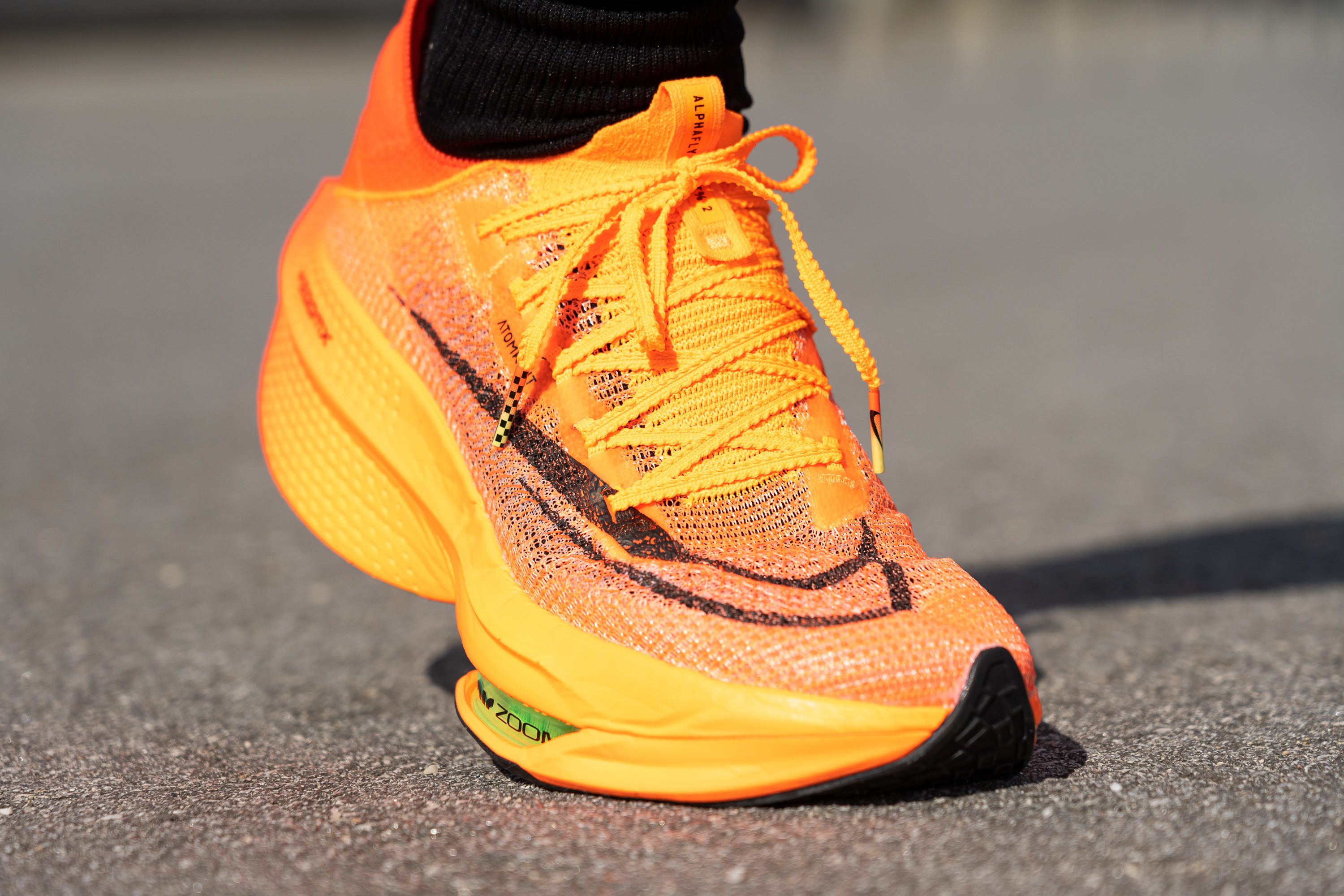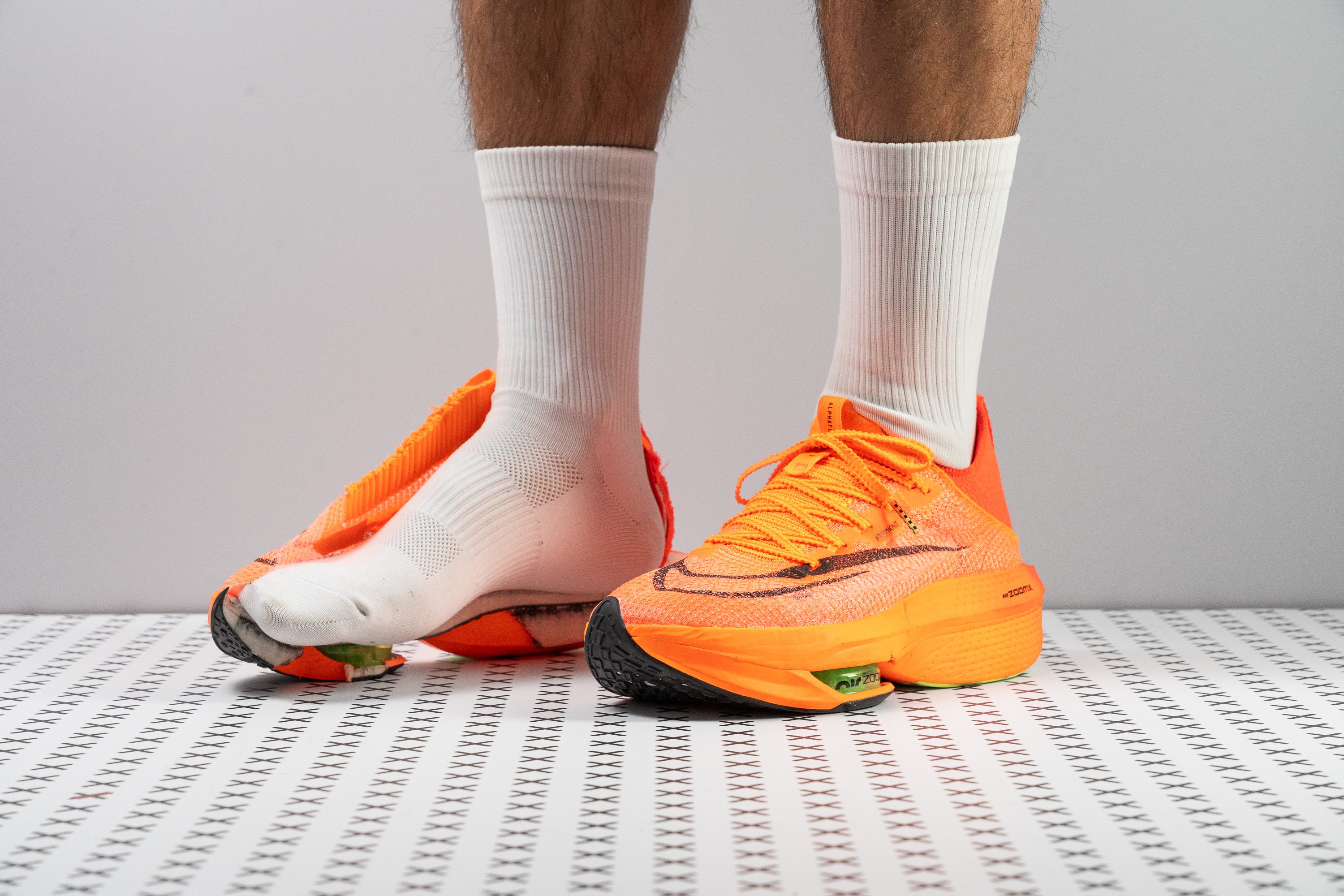Our verdict
- Top pick in best long distance Nike running shoes (2023)
- Top pick in best Nike ZoomX running shoes (2023)
Pros
- Great for personal bests
- Propulsive ride
- Very comfortable
- Versatile for short and long runs
- Amazing lockdown
- Airy upper
- More stable than v1
- Long-lasting
- Less annoying noise
Cons
- Expensive for sure
- Still slightly unstable on corners
- Hard to slip on
- Heavier and less magical than v1
Audience verdict
Comparison
The most similar running shoes compared
+ + Add a shoe | |||||
|---|---|---|---|---|---|
| Audience score | 84 Good! | 88 Great! | 90 Superb! | 88 Great! | |
| Price | $275 | $225 | $250 | $285 | |
| Pace | Competition | Competition | Competition | Competition | |
| Shock absorption | - | High | High | High | |
| Energy return | - | High | High | High | |
| Traction | - | High | High | Moderate | |
| Arch support | Neutral | Neutral | Neutral | Neutral | |
| Weight lab Weight brand | 8.5 oz / 240g 8.6 oz / 243g | 7.8 oz / 220g 7.7 oz / 218g | 6.5 oz / 183g 6.4 oz / 181g | 7.1 oz / 201g 7 oz / 198g | |
| Lightweight | ✓ | ✓ | ✓ | ✓ | |
| Drop lab Drop brand | 4.7 mm 8.0 mm | 9.5 mm 8.0 mm | 6.5 mm 5.0 mm | 8.5 mm 8.0 mm | |
| Strike pattern | Mid/forefoot | HeelMid/forefoot | Mid/forefoot | HeelMid/forefoot | |
| Size | Slightly small | True to size | Slightly small | Slightly small | |
| Midsole softness | Soft | Balanced | Balanced | Soft | |
| Difference in midsole softness in cold | Small | Small | Small | Small | |
| Toebox durability | Good | Good | Good | Bad | |
| Heel padding durability | - | Good | Good | Good | |
| Outsole durability | - | Good | Good | Bad | |
| Breathability | Breathable | Breathable | Breathable | Breathable | |
| Width / fit | Narrow | Medium | Narrow | Medium | |
| Toebox width | Narrow | Medium | Medium | Medium | |
| Stiffness | Stiff | Stiff | Stiff | Stiff | |
| Torsional rigidity | Stiff | Stiff | Stiff | Stiff | |
| Heel counter stiffness | Flexible | Flexible | Flexible | Flexible | |
| Plate | Carbon plate | Carbon plate | Carbon plate | Carbon plate | |
| Rocker | ✓ | ✓ | ✓ | ✓ | |
| Heel lab Heel brand | 38.6 mm 40.0 mm | 38.1 mm 40.0 mm | 39.1 mm 39.5 mm | 38.1 mm 40.0 mm | |
| Forefoot lab Forefoot brand | 33.9 mm 32.0 mm | 28.6 mm 32.0 mm | 32.6 mm 34.5 mm | 29.6 mm 32.0 mm | |
| Widths available | Normal | Normal | NormalWide | Normal | |
| Orthotic friendly | ✗ | ✓ | ✓ | ✗ | |
| Season | SummerAll seasons | SummerAll seasons | SummerAll seasons | SummerAll seasons | |
| Removable insole | ✗ | ✓ | ✓ | ✗ | |
| Ranking | #468 Bottom 31% | #137 Top 36% | #78 Top 21% | #127 Top 34% | |
| Popularity | #266 Top 39% | #42 Top 11% | #155 Top 41% | #23 Top 6% |
Size and fit
Size
Nike Alphafly 2 fits slightly small (184 votes).
Who should buy Nike Air Zoom Alphafly Next% 2
Buy this shoe if you are after your personal best in your next race. It doesn’t come cheap at all, but it is worth it 100%.
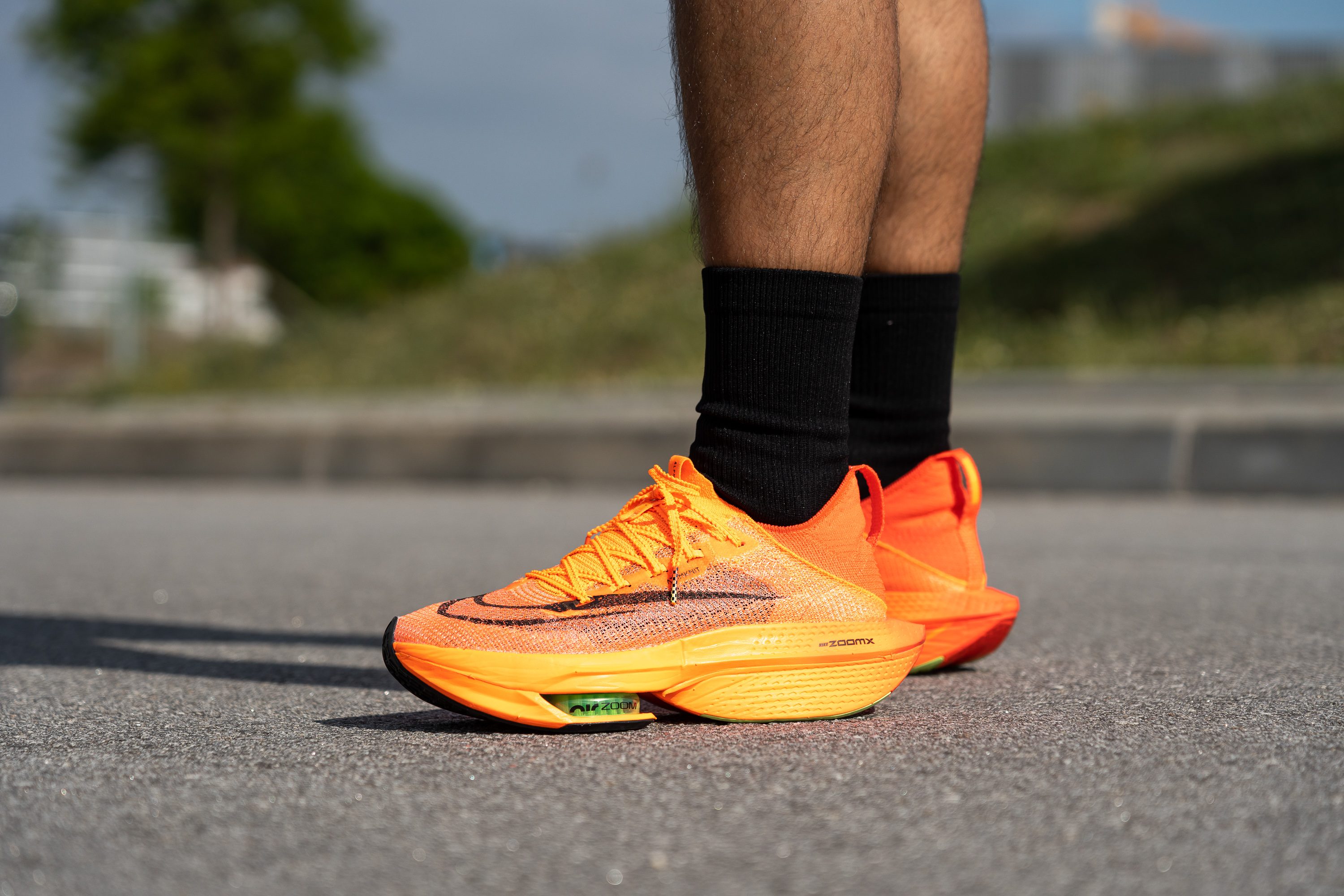
Who should not buy it
We suggest looking elsewhere if you:
- want a lighter and cheaper, but equally fast shoe. Try the Nike ZoomX Vaporfly Next% 2.
- want a more stable racing shoe. ASICS MetaSpeed Sky+ is a better choice.
Nike Alphafly Next% vs Nike Alphafly Next% 2
Compared to the first iteration, the Alphafly Next% 2:
- is more stable
- is 22g heavier
- is not that loud
- has a slightly better traction
- is slightly firmer.
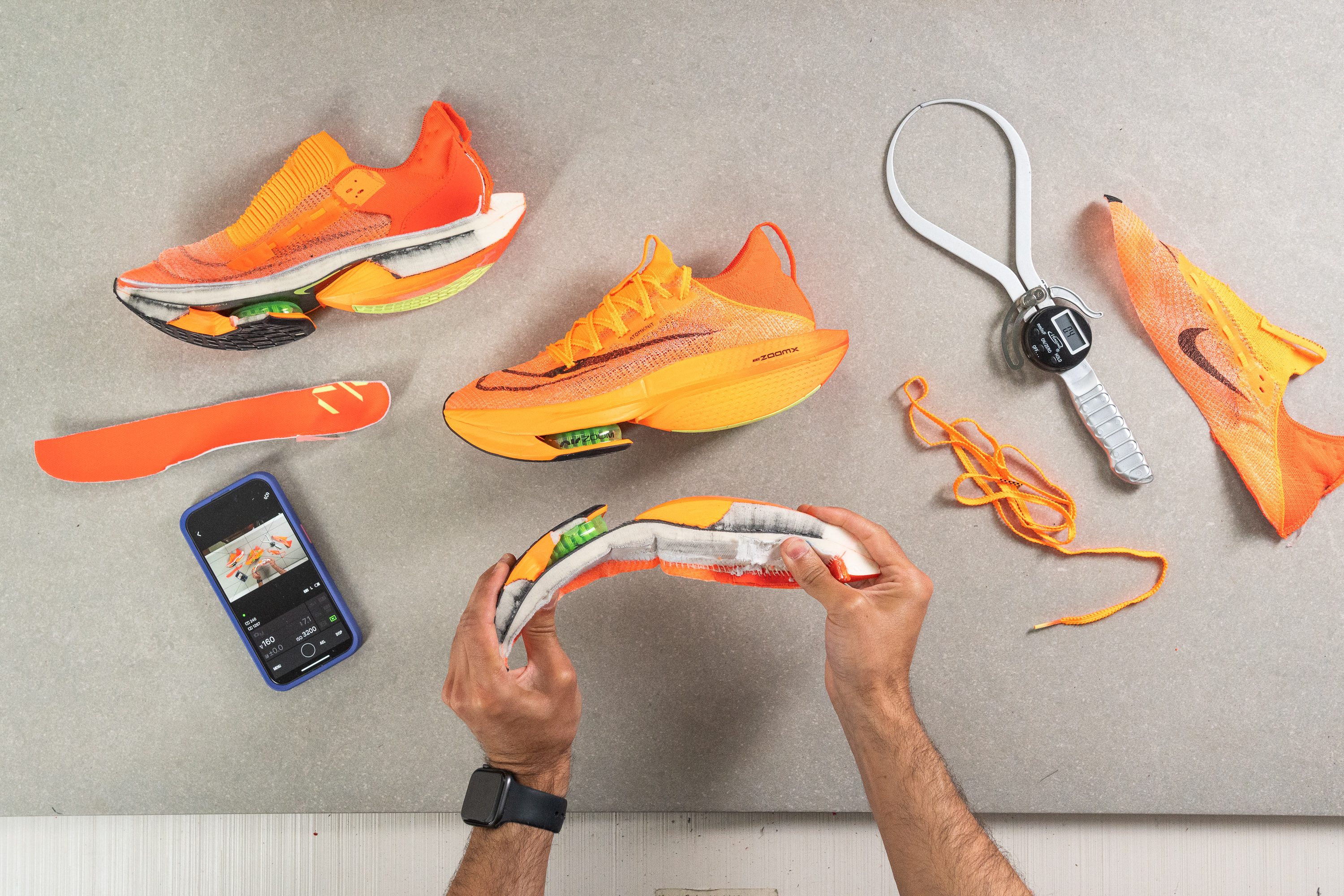
Comfy and airy upper
The upper of the Alphafly 2 is so delightfully breathable!
The results of our breathability test fully confirmed our initial impressions. We awarded this Nike shoe with the highest possible score: 5 out of 5!
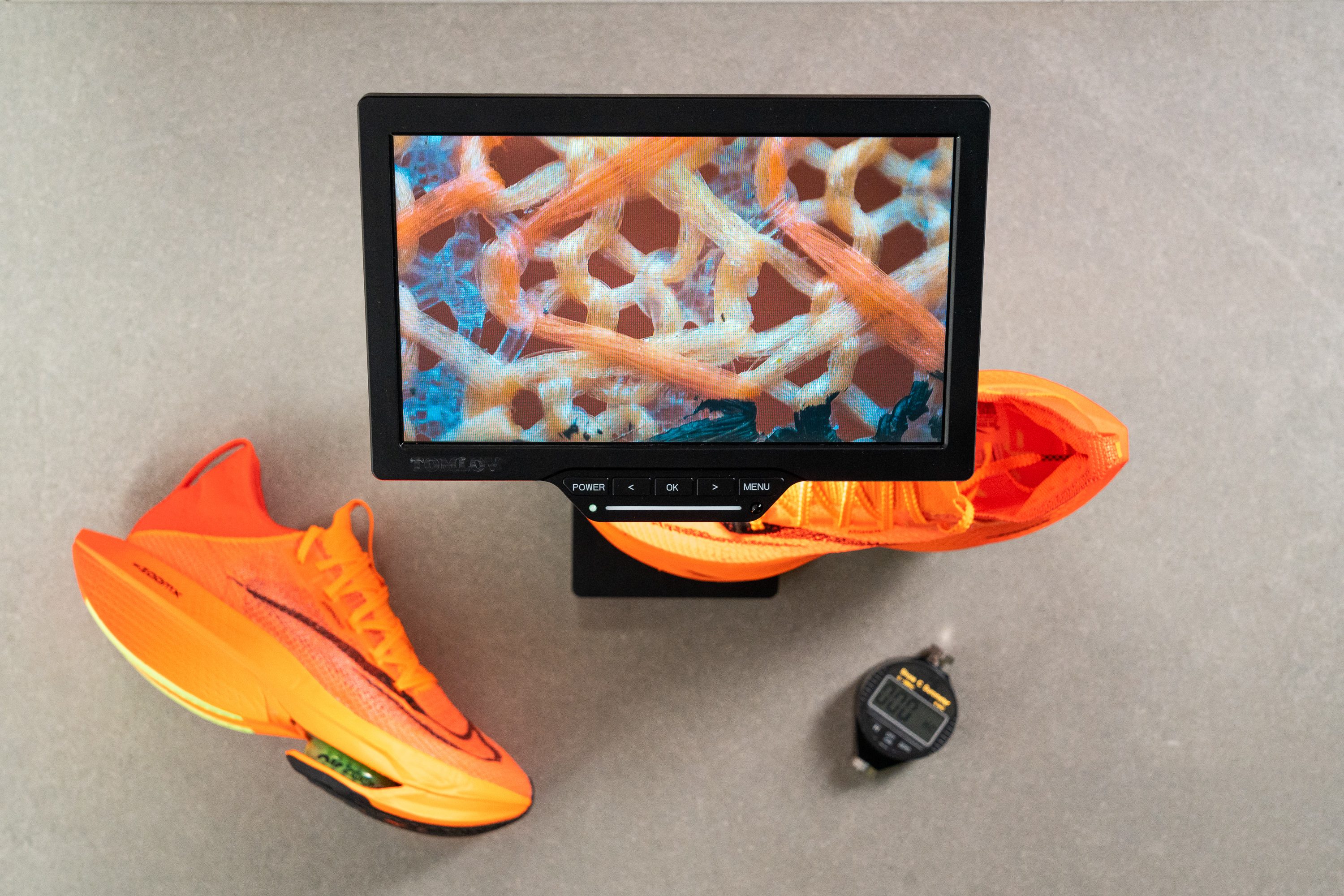
This was achieved thanks to the super-airy upper. Nike is doing this in all of its recent racing shoes, like the Streakfly.
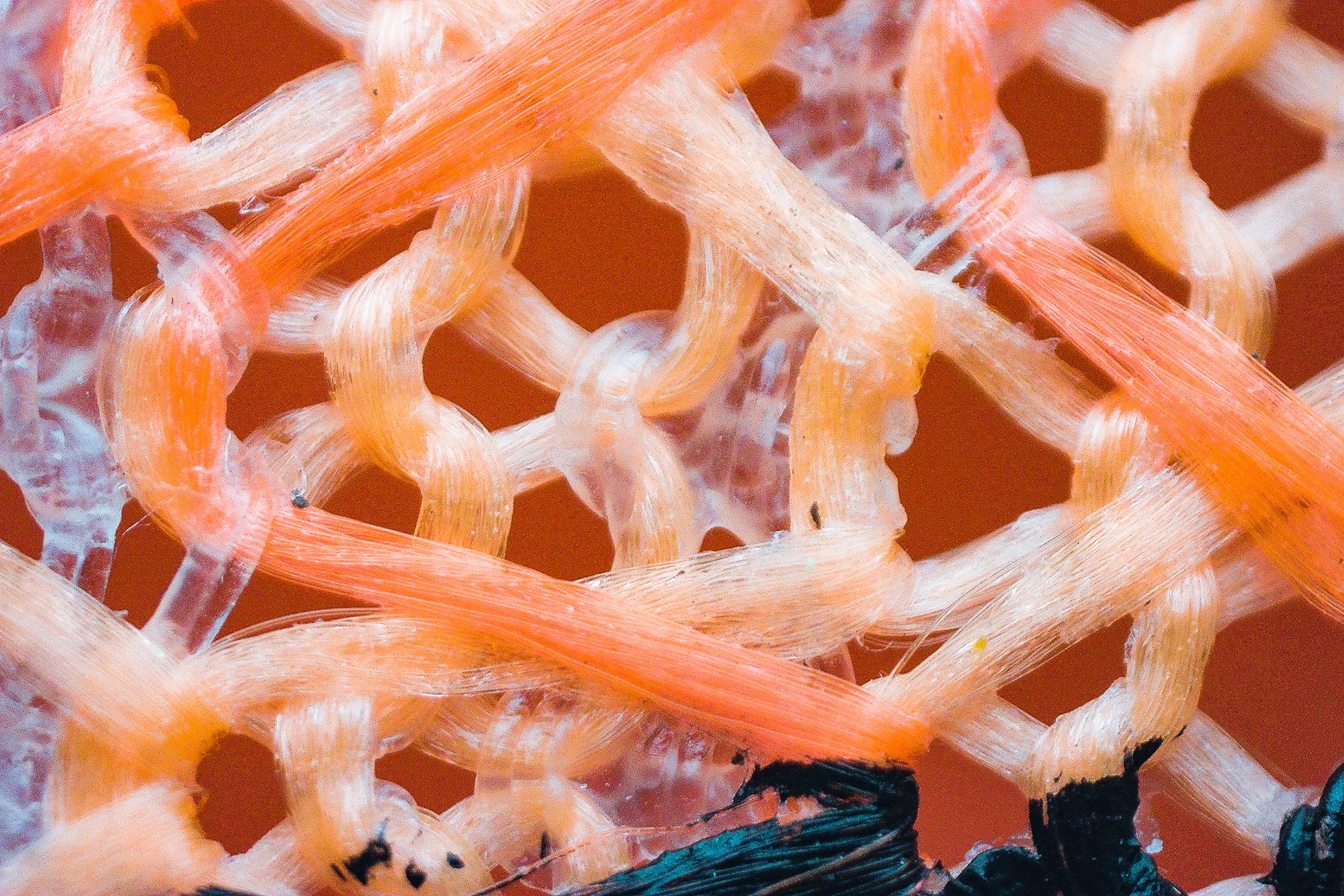
As you can see, light passes through the upper without any obstruction in the midfoot and forefoot, ensuring proper air circulation.
A super shoe that will last longer than most daily trainers
This is a rarity in racing shoes, but the updated version of the Atomknit upper is really durable. Absolutely no chance of breaking it with your big toe or pinky toe.
How can we be so sure? Well, in our standardized Dremel test, where we apply consistent force and RPM to each shoe for 4 seconds, the Alphafly 2 delivered a truly astonishing and extraordinary performance.
For instance, take a look at the comparison with the Hoka Kawana, a daily trainer from Hoka.
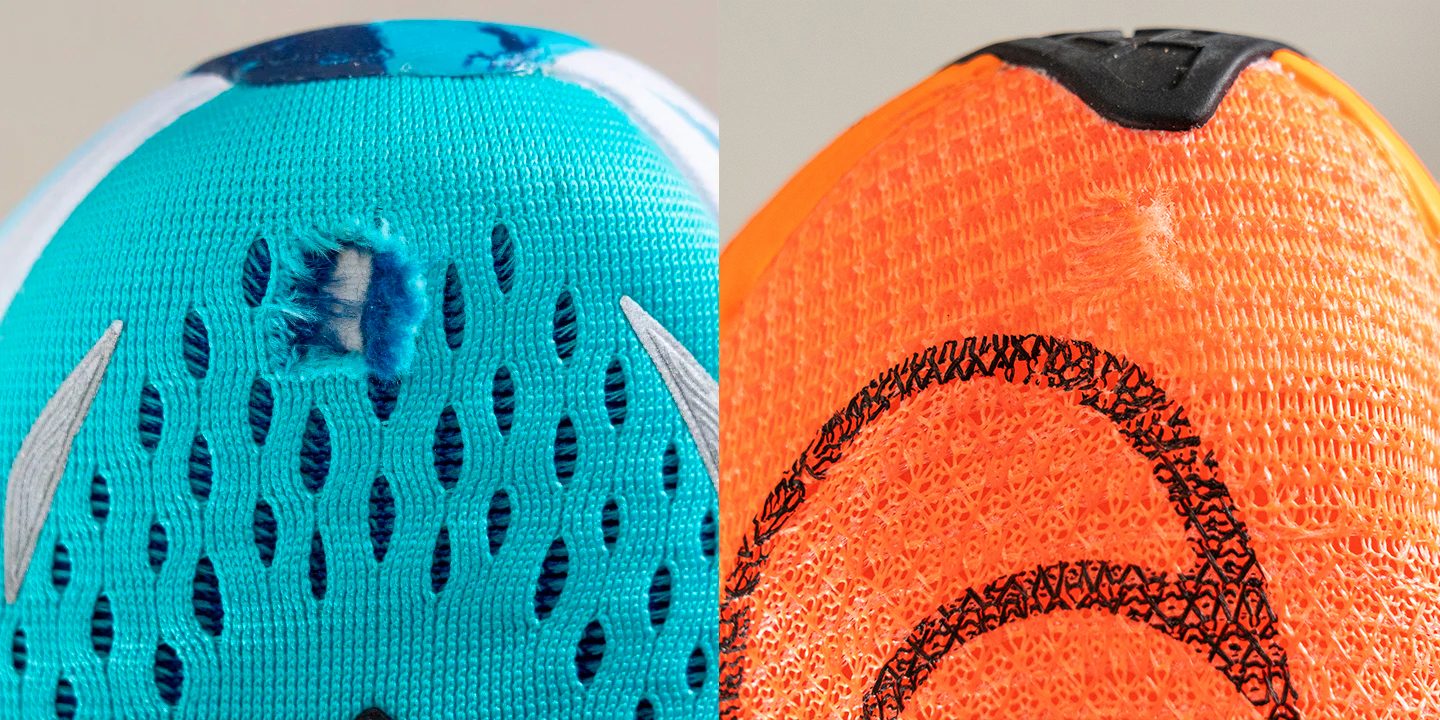
Not for easy runs
Wearing the Alphafly 2 for slower paces is a really bad idea! The shoe feels cumbersome and clunky because of its rigidity and stratospheric stack height.
But as soon as you pick up the pace, it turns into a totally different shoe! It is so incredibly propulsive and responsive that it makes us feel like flying!
To check how stiff the Alphafly 2 actually is due to the carbon plate, we used a gauge that measures how much force it takes to bend the shoe to a 90º angle. Turns out that it takes a whopping 69.7N of force! That's 57% more than it takes an average road shoe. But when compared to other plated racers, this Nike is only 10% stiffer.
In our manual assessment, we rated it a 5—being 5 the stiffest—for longitudinal flexibility and a 4—again, out of 5, being 5 the max score—for torsional flexibility, which is consistent with most racing shoes because of the carbon-fiber plate. For instance, it's the same score that was received by the Nike Vaporfly Next% 2 and the ASICS Metaspeed Sky+.
Same height, but better stability in the Alphafly Next% 2
This is a big shoe that performs extremely well, but only in the right conditions. With all that midsole construction, you must be cautious on sharp turns. Do check the course of your next race before choosing the Alphas!
We also found that the Nike Alphafly 2 is more stable than its predecessor, thanks to a wider platform. However, for a shoe with that much stack height (38.6 mm), it can never be stable enough.
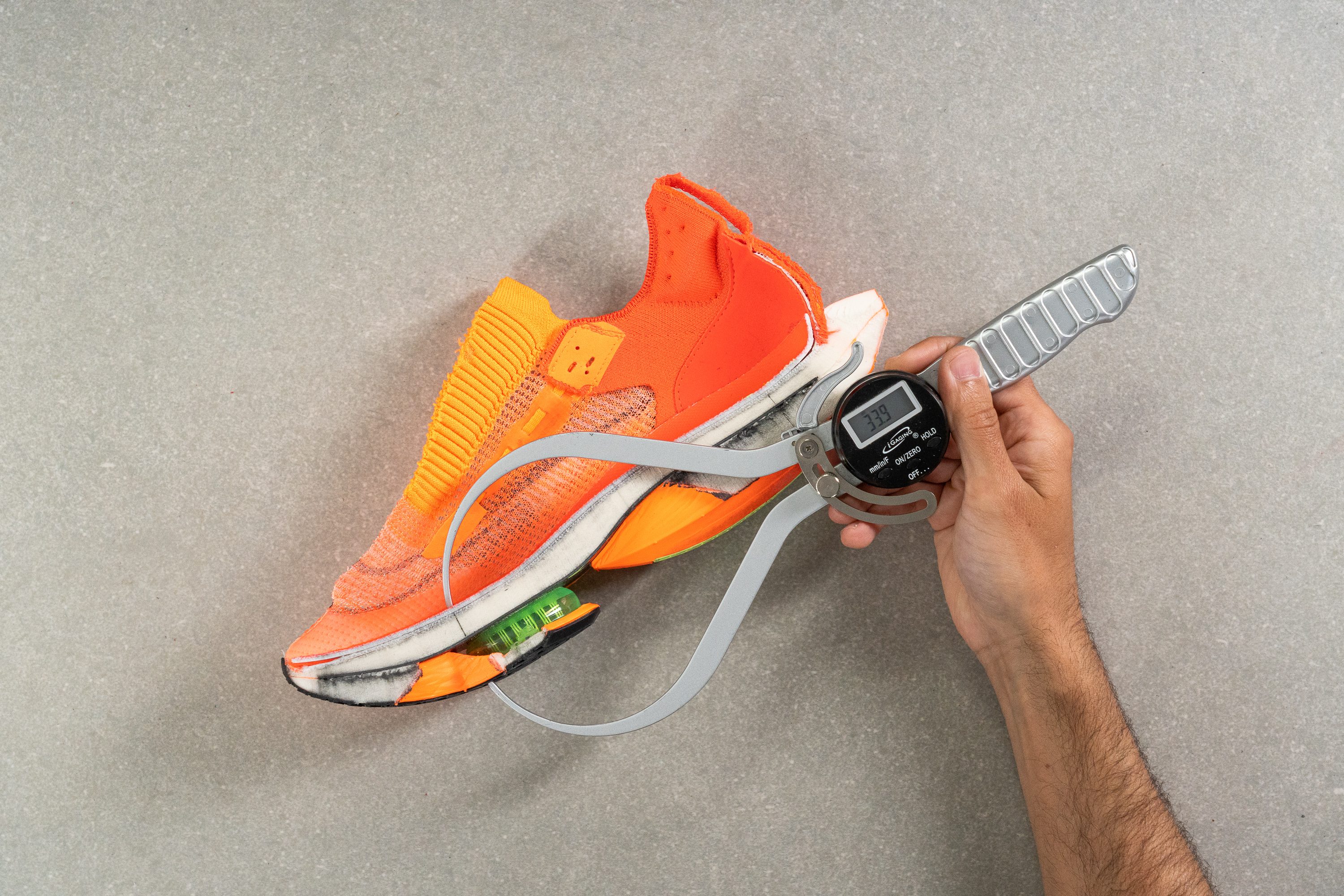
Nike states that the Alphafly 2 has an 8 mm drop, up from the 4 mm of the first version, resulting in a 40/32 mm heel-to-toe drop.
Our meticulous measurements tell a different story: the stack height remains nearly the same as the previous version, with a 4.7 mm drop and a 38.6/33.9 mm heel-to-toe measurement. This is quite different from the official claims, but it aligns with our own experience running in the shoe.
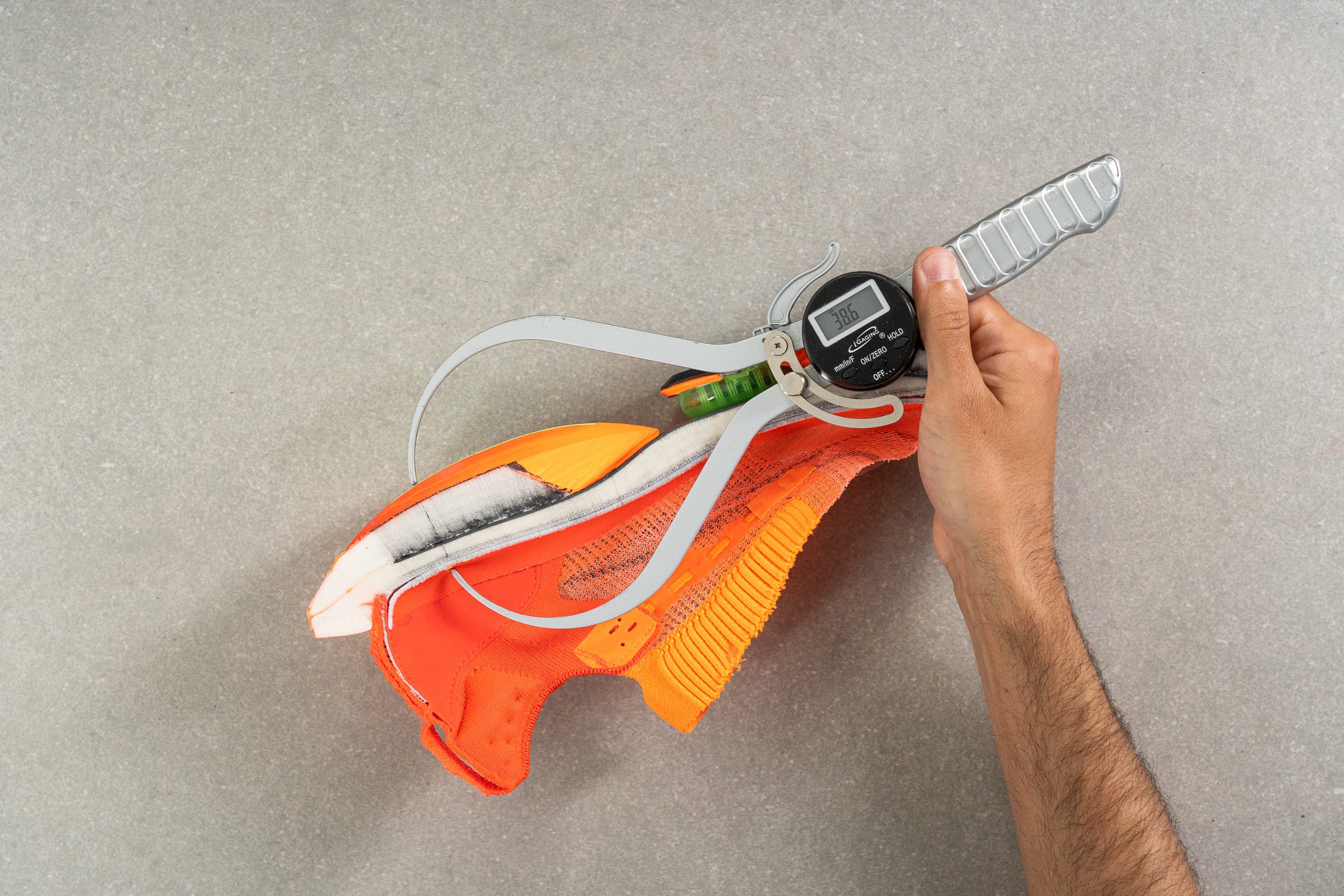
A truly leg-saving super shoe
A large amount of PEBAX-based ZoomX foam makes this shoe very protective and forgiving. Even after going for a half-marathon distance, our legs and feet weren't so beaten up the next day!
And yes, it really has the classic ZoomX cloud-like feel.
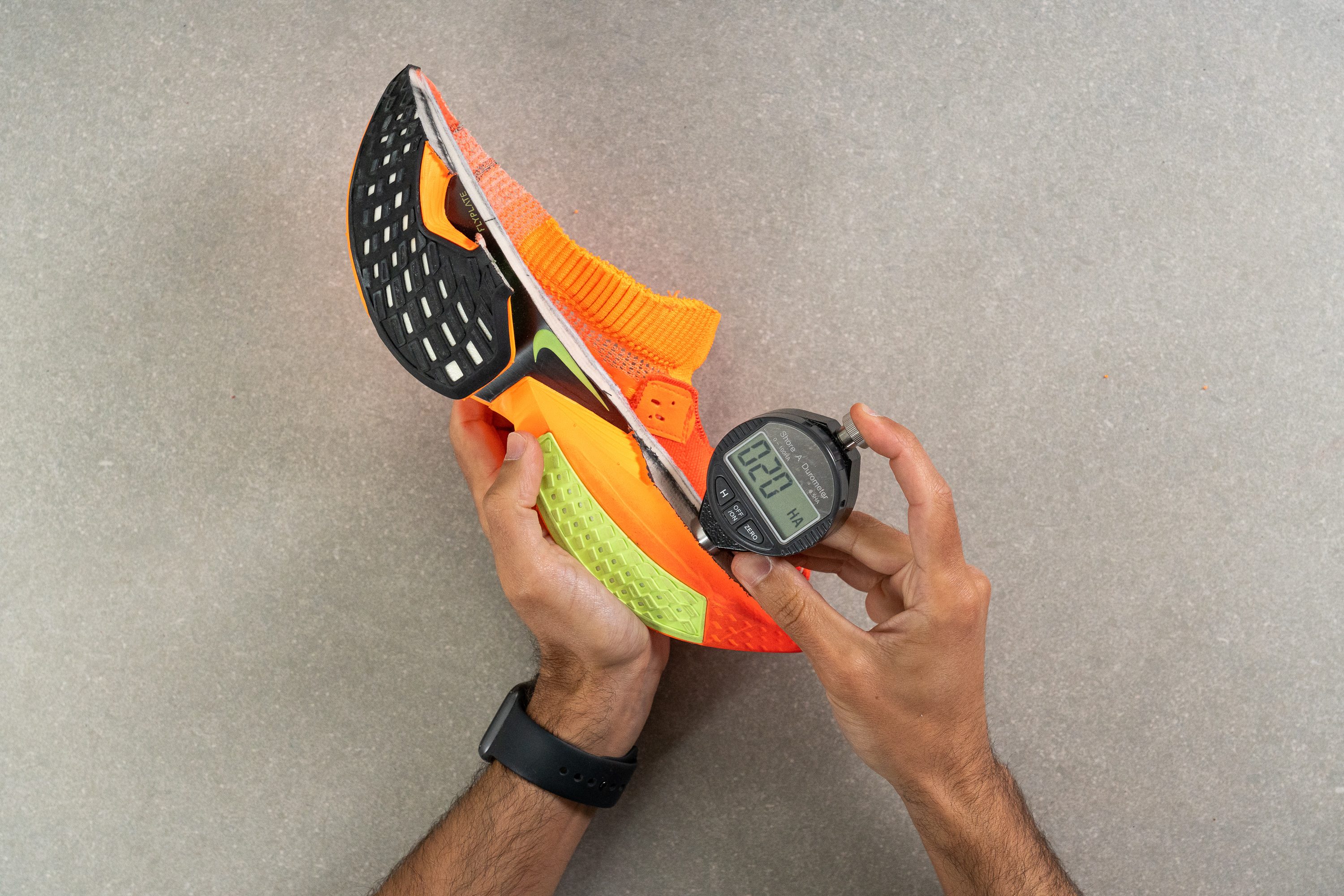
We measured the foam at 19.1 HA, which is on par with most super shoes. It's just 0.5% firmer than the Vaporfly Next% 2, 15% softer than Adidas' Adios Pro 2, and 37% softer than the Metaspeed Edge+ from Asics.
Additionally, Nike has chosen to maintain the rocker feature that fans of this model have enjoyed in the previous version. There is a noticeable curve at both ends of the shoe that will facilitate smoother transitions, especially for heel strikers.
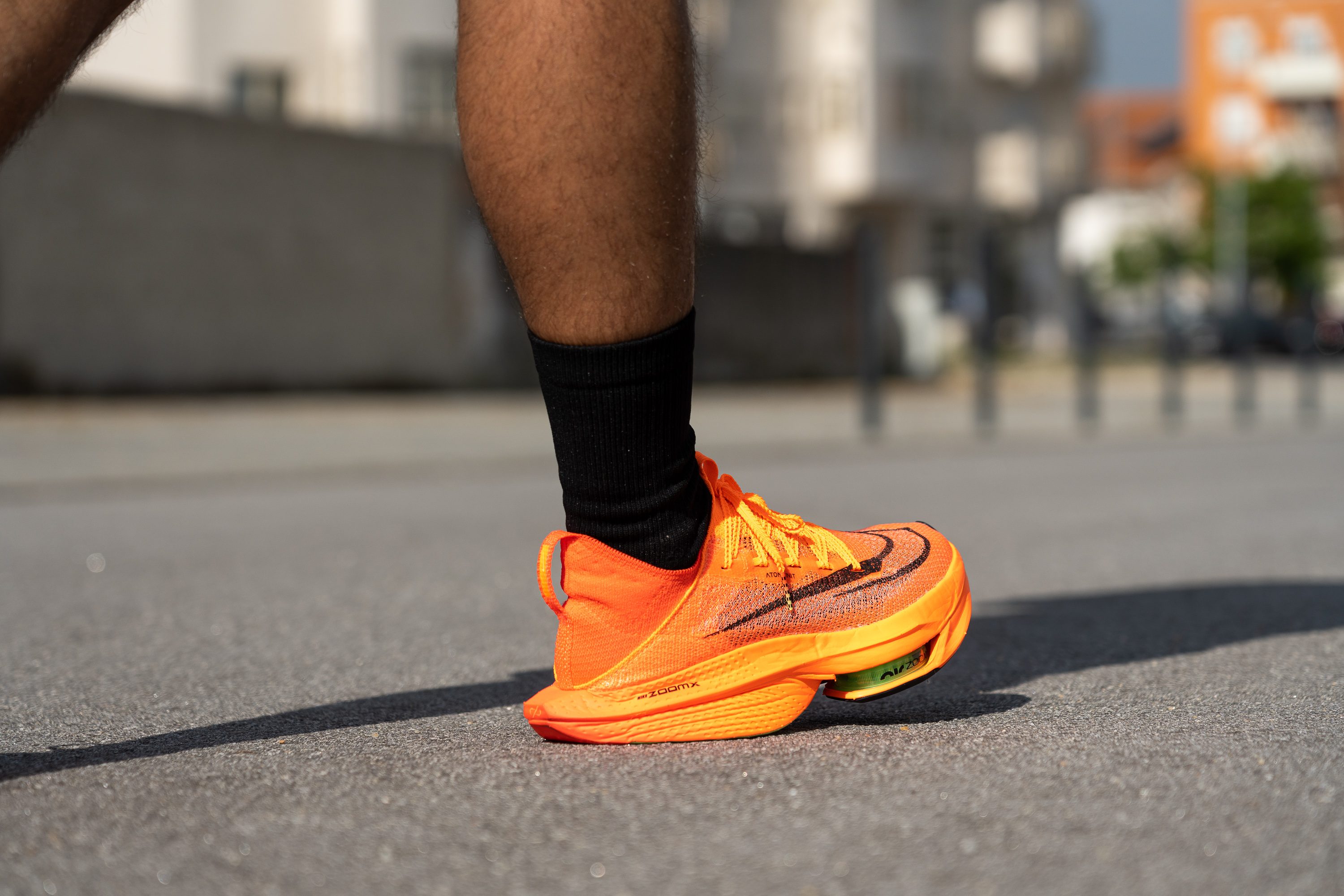
Fit is nearly perfect in the Alphafly 2
It is quite tricky to get the shoe on but once it's there, we got total security! The fit is super snug bit leaves some breathing room in the toebox.
We do believe that this is one of the best-fitting race shoes out there!
The Alphafly 2's new Atomknit upper is truly impressive!
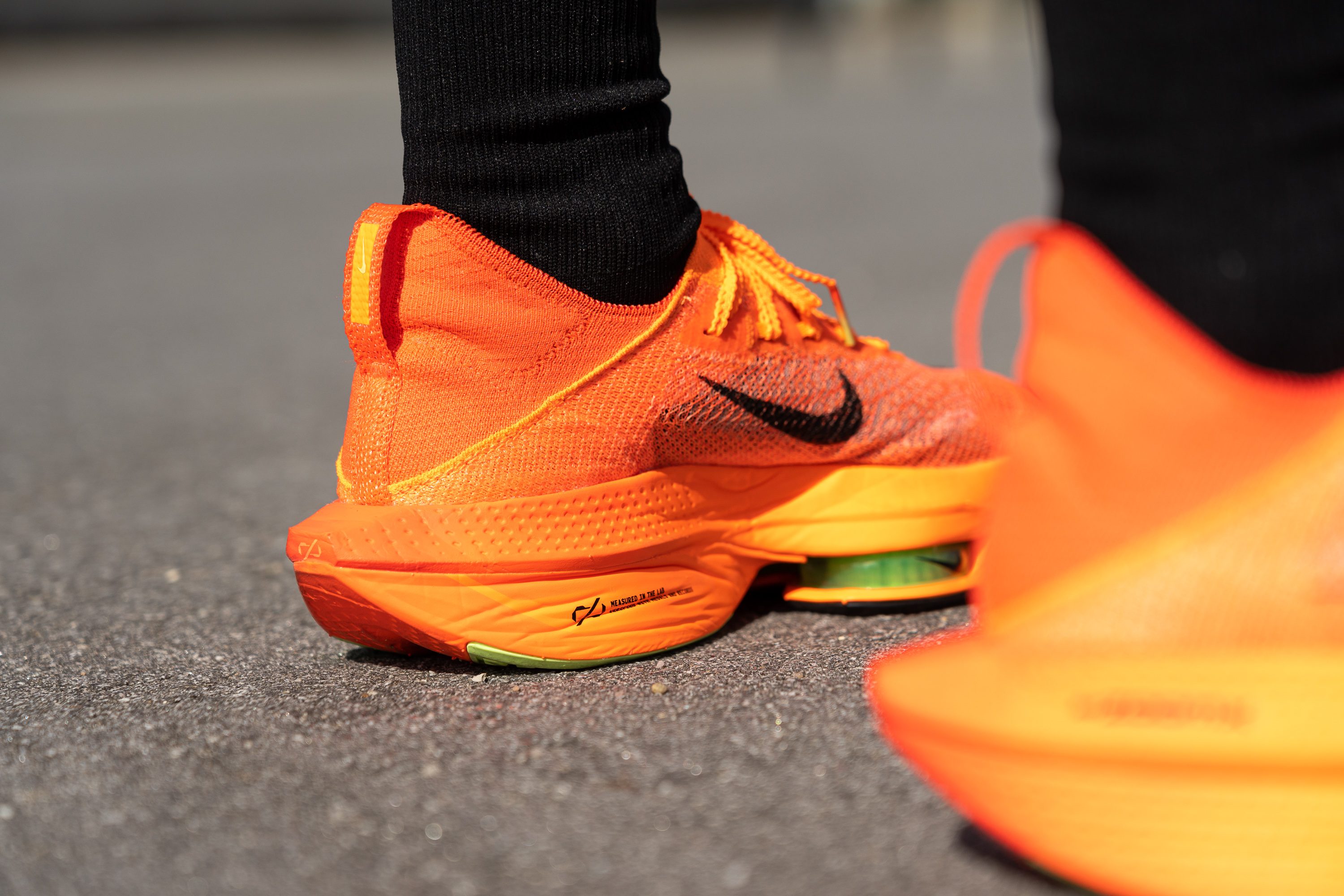
The main issue with the Atomknit upper is that similar to version 1, it remains challenging to slide your feet into the shoes, and the finger loop heel tab is absolutely essential for this task. And of course, being a racing shoe, the heel counter is really soft—1 out of 5 in our manual assessment.
Finally, the tongue. Or the absence of it. The Alphafly v2 follows the steps of its predecessor and goes again with a sock-like integrated tongue, so it will again divide the shoe between lovers and haters.

The Alphafly features a 3.5 mm-thick, integrated sock-like tongue that offers exceptional cushioning, especially for a high-performance shoe. For comparison, the tongue in the ASICS Metaspeed Sky is 85% thinner, while the Saucony Endorphin Pro 3 is 65% thinner.
This design choice makes sense, as Alphafly remains comfortable for marathon distances and beyond. Oh, and a handy pull tab on the tongue is also present, which greatly simplifies the process of slipping into the shoe. And a quick tip: For the best possible fit, it's highly recommended to give this pull tab a firm tug once you're settled inside the shoe.
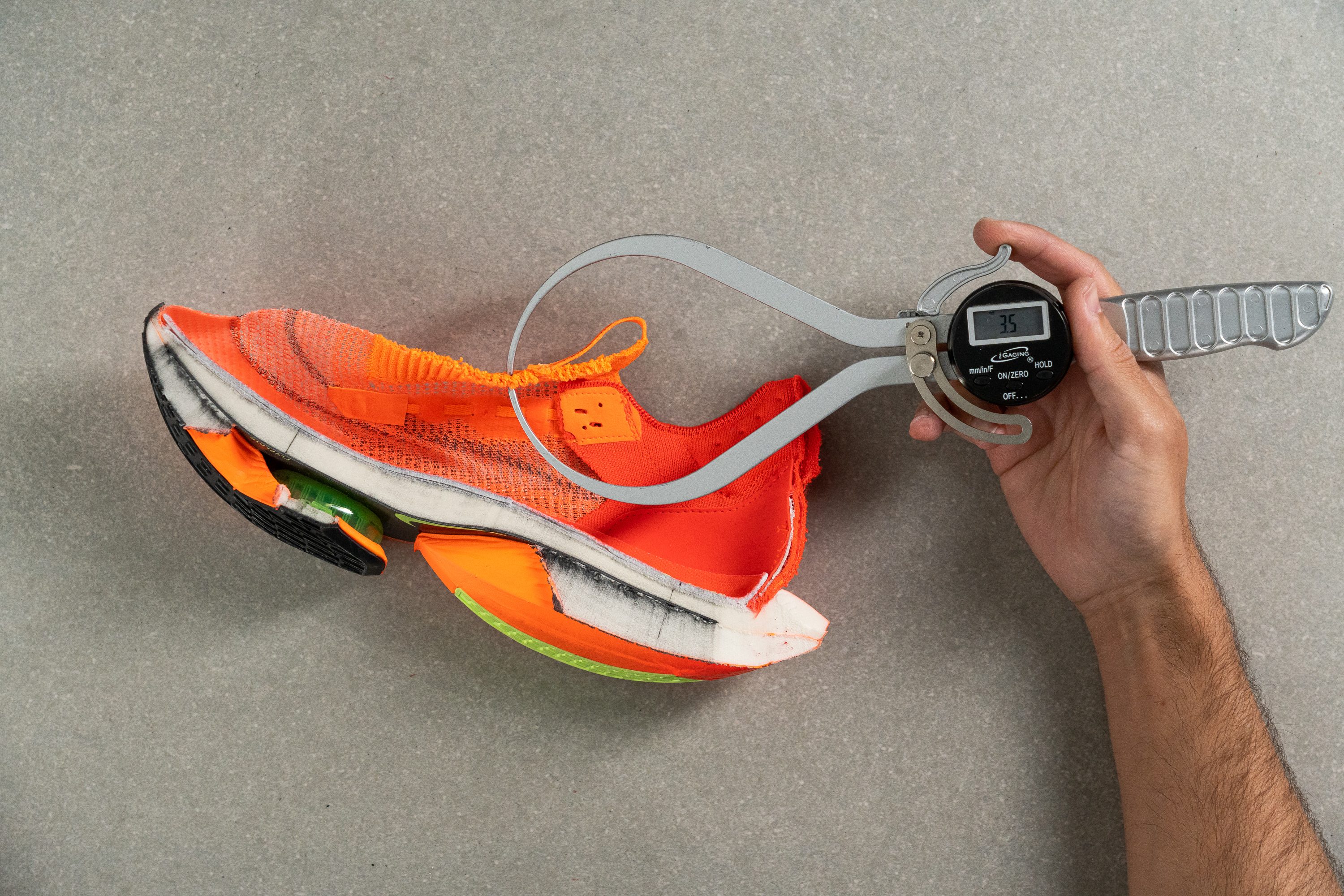
Nike Alphafly Next% 2 is better suited for long races
We believe that the Alphafly's sweet spot is in the half marathons and marathons.
It CAN be worn for blazing-fast 5K or 10K races, but it's important to note that its weight might be a slight drawback for these shorter distances.
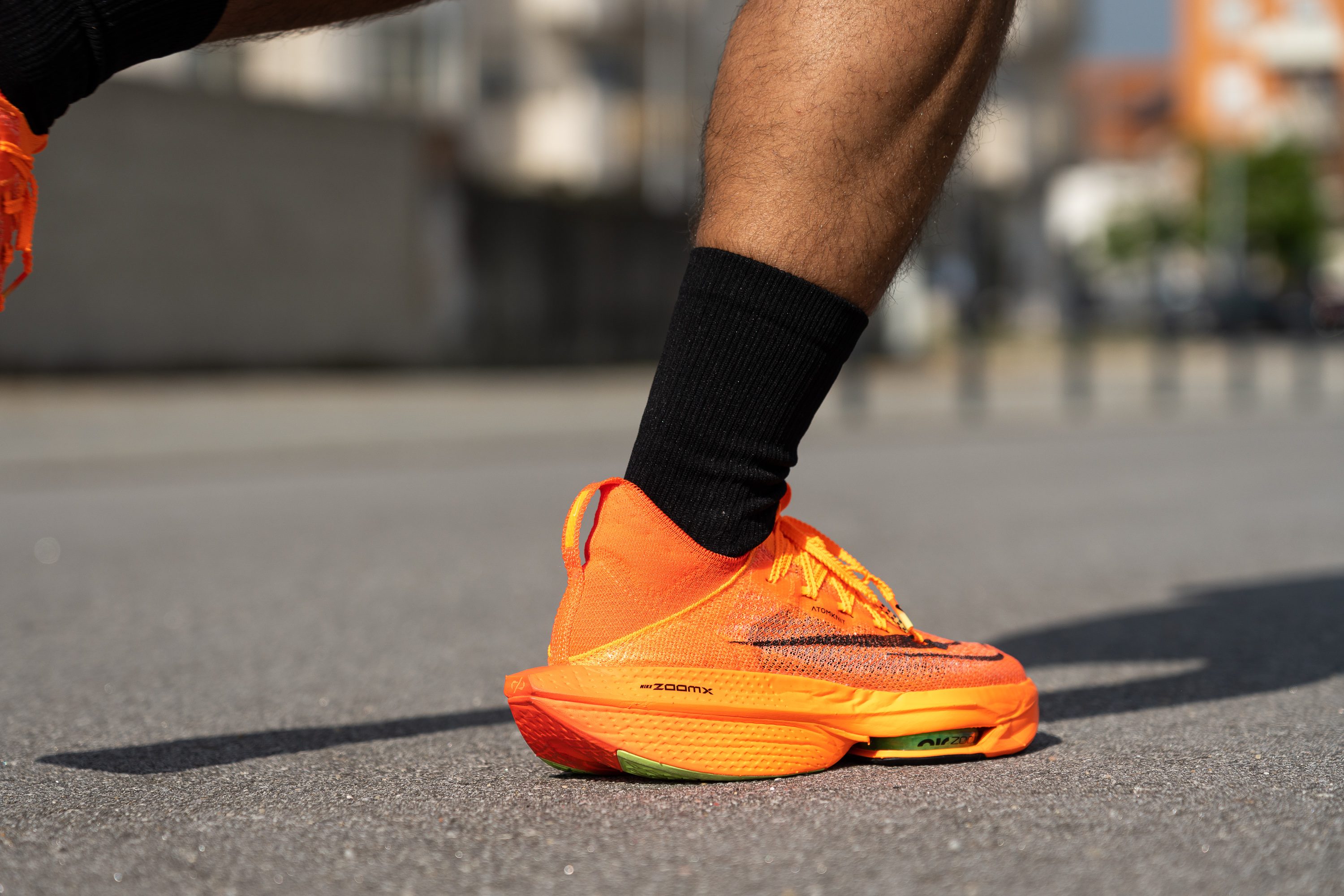
With the average carbon-plated racing shoe weighing in at a mere 203 grams, the Alphafly 2 tips the scales at a slightly heftier 243 grams. This additional weight may make it less suitable for those seeking a lighter, more agile option in shorter races, even at half marathons.
Winter running? Yes, please!
As we discussed in our guide about running shoes and temperatures, PEBAX foams are simply the best performers under freezing temperatures, bar none. Therefore, the Alphafly Next% 2 is expected to be a great shoe in chilly weather.
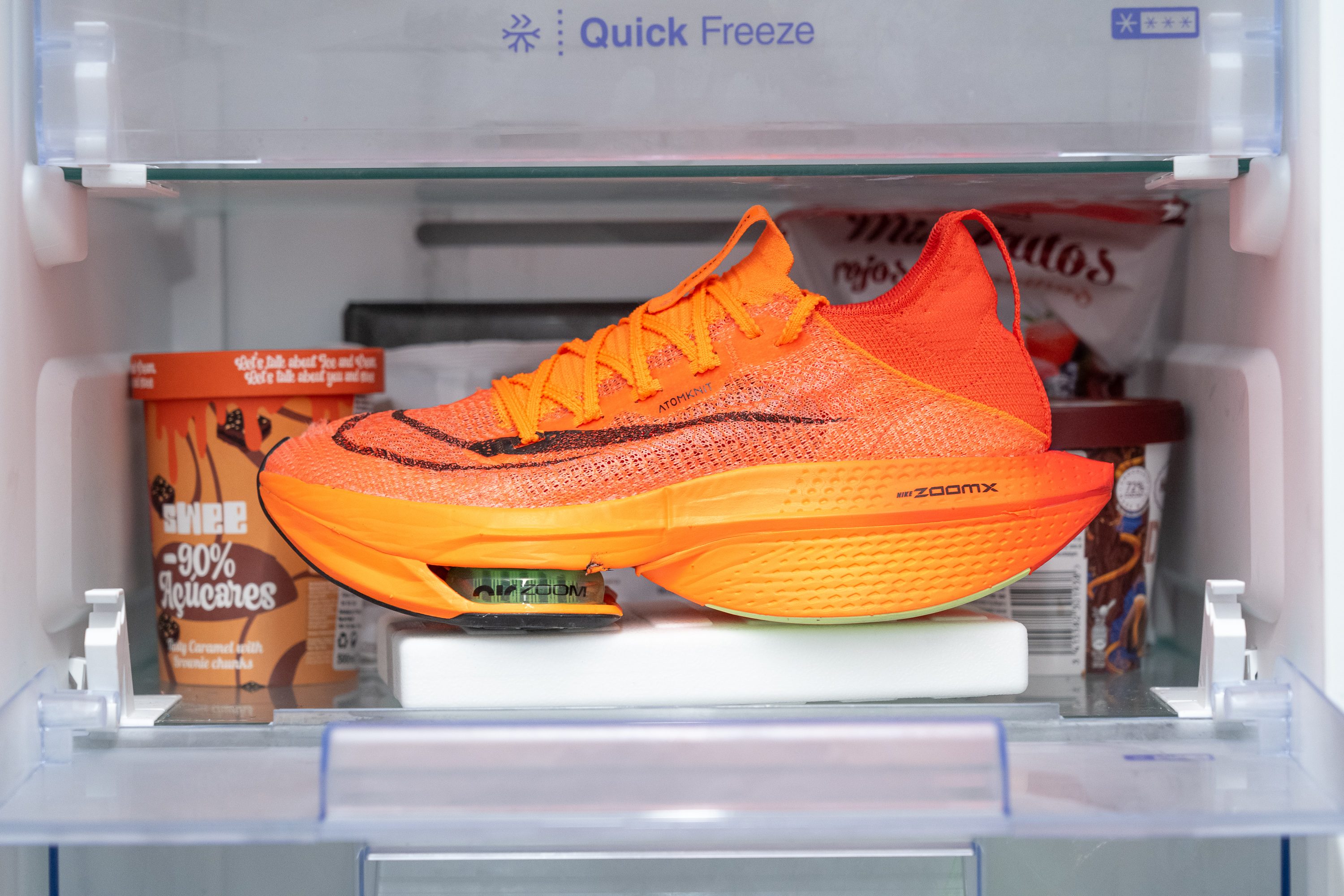
The widest platform ever in a Nike super shoe...
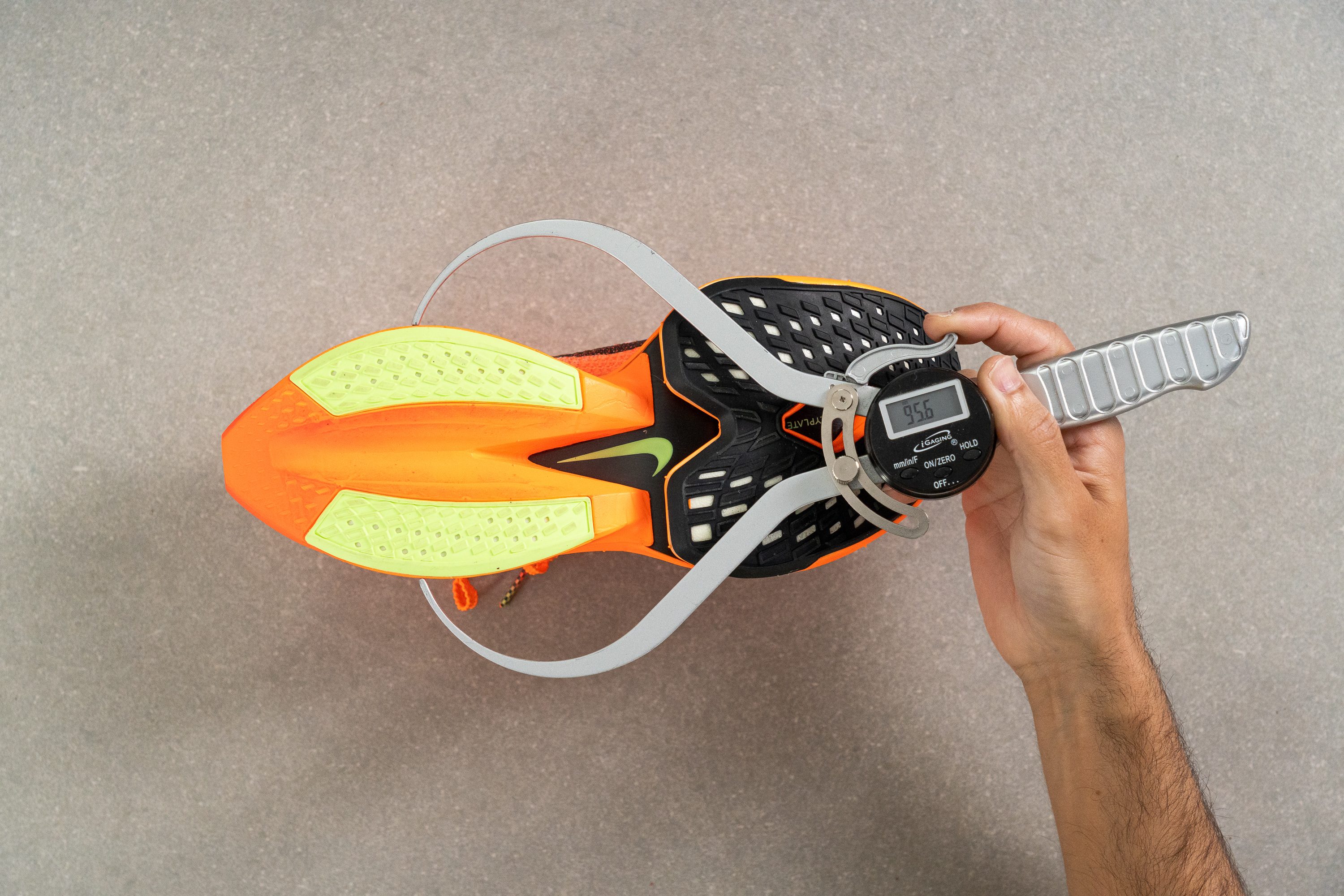
For those who feel that the typical racing shoe is too unstable and features a narrow base, the Alphafly Next% 2 is sure to deliver. Nike surprised everyone back in 2020 with the first version by creating a wider design than competitors, and they've taken it a step further with the second iteration.
We used a caliper to measure the Alphafly 2's base and found that it boasts a substantial 7.5% increase in forefoot width compared to the Vaporfly Next% 2. Even more impressive, the heel width is an earth-shattering 29% wider! That's right, you're not misreading these numbers, and we haven't made any mistakes either!
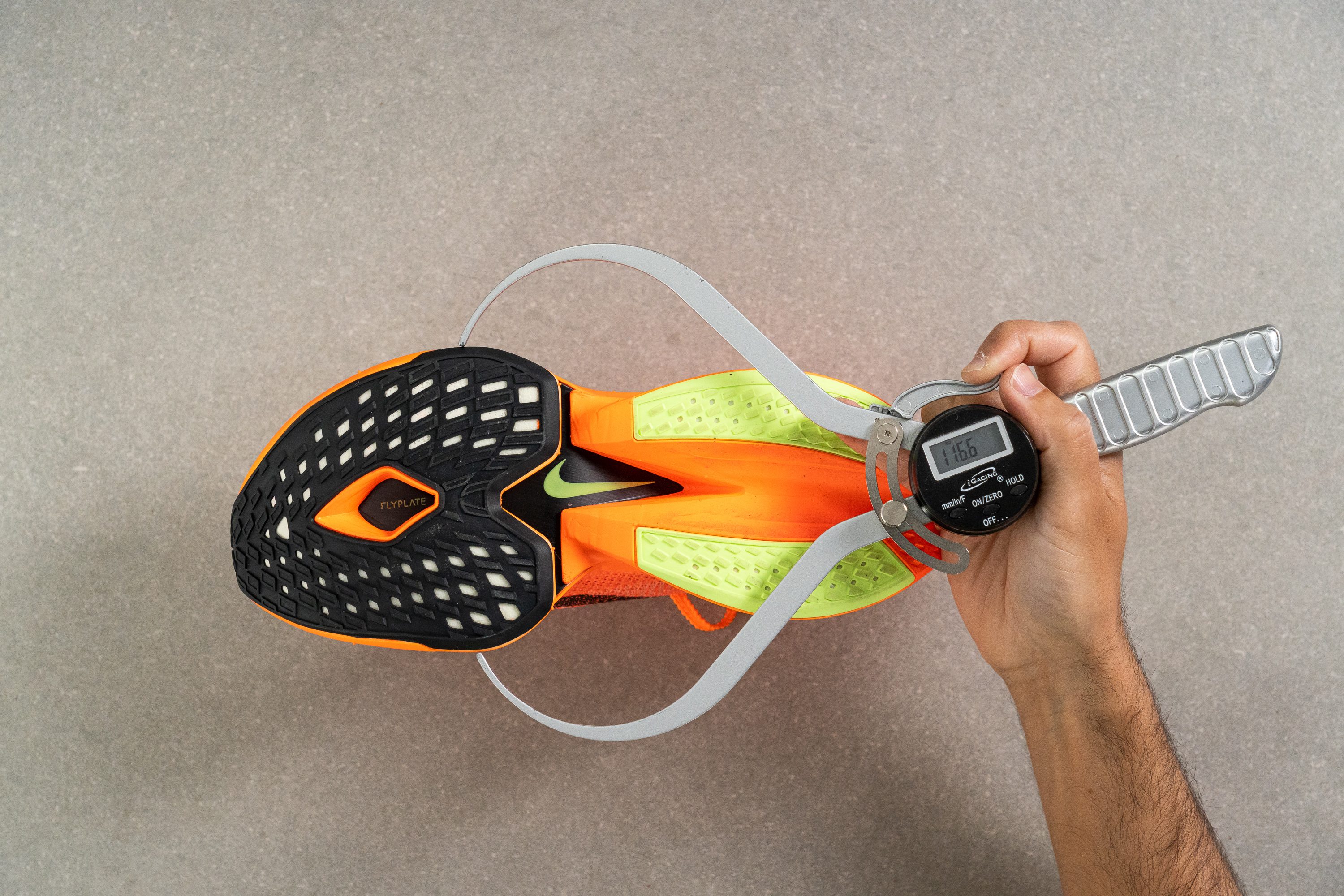
...and enough real estate for your feet
As with any supershoe, the fit is snug. But, wide sizes aside—which are not an option in this model, this is probably the best racing shoe for those with wide feet.
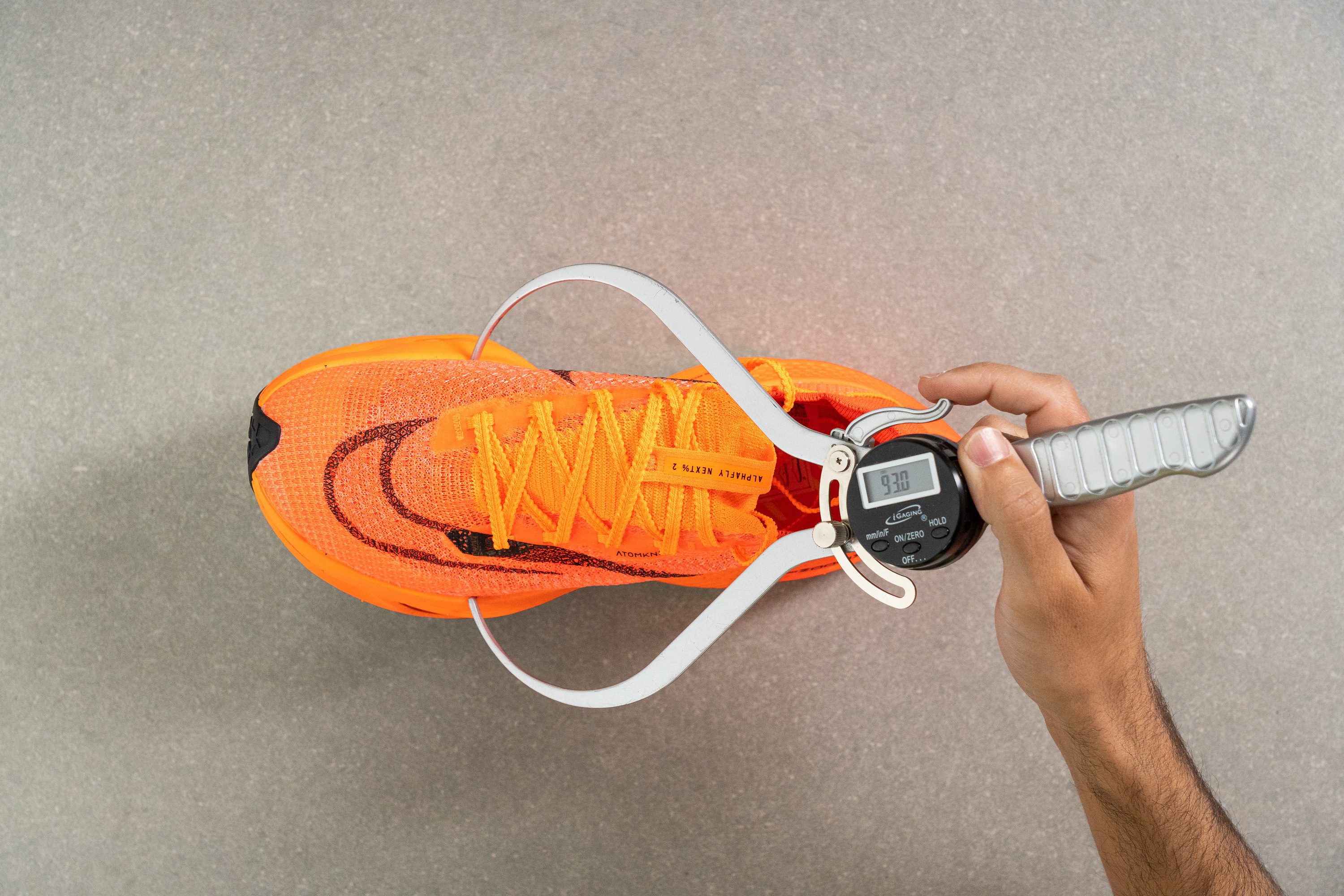
The upper of the Alphafly 2 measures 93.0 mm at its widest point and 71.4 mm at the big toe area. How do these dimensions compare to some daily trainers? Let's see:
| Shoe | Upper - Max width (mm) | Upper - Big toe (mm) | Tapers by |
| Nike Air Zoom Alphafly Next% 2 | 93.0 | 71.4 | 23.2% |
| New Balance Fresh Foam X More v4 | 97.4 | 74.4 | 23.6% |
| Adidas Runfalcon 2.0 | 98.8 | 69.2 | 29.9% |
| Hoka Clifton 9 | 95.8 | 74.5 | 22.2% |
| Saucony Kinvara 14 | 99.8 | 74.0 | 25.8% |
As you can see, the dimensions of this Nike super shoe are comparable to those of many spacious daily trainers. When compared to one of the widest racing shoes out there—the Hoka Carbon X 3—the Alphafly Next% 2 is even slightly wider at both measurement points: 1.1% and 0.7%.
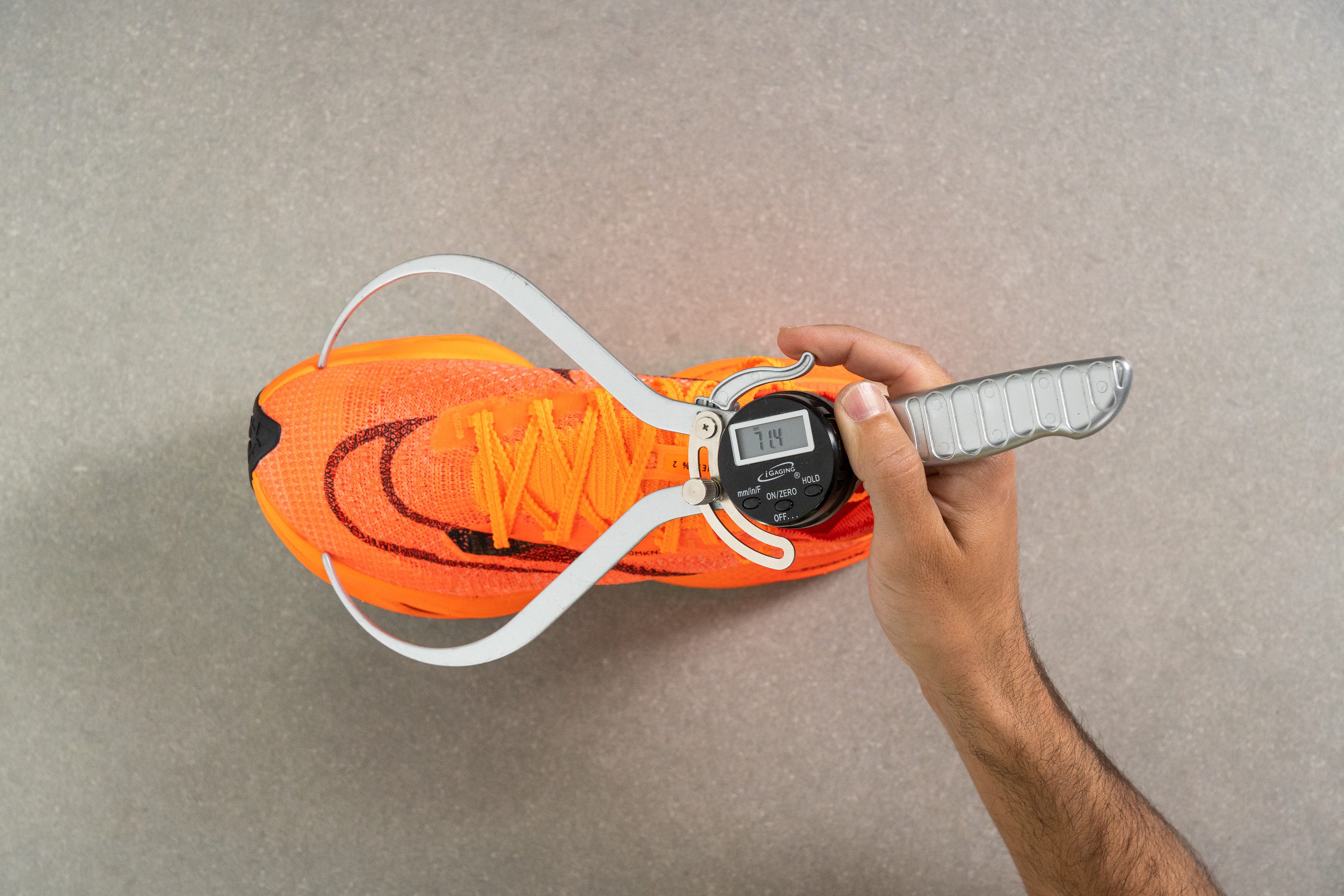
A true racing shoe with a long-lasting outsole
This Nike shoe is also very durable.
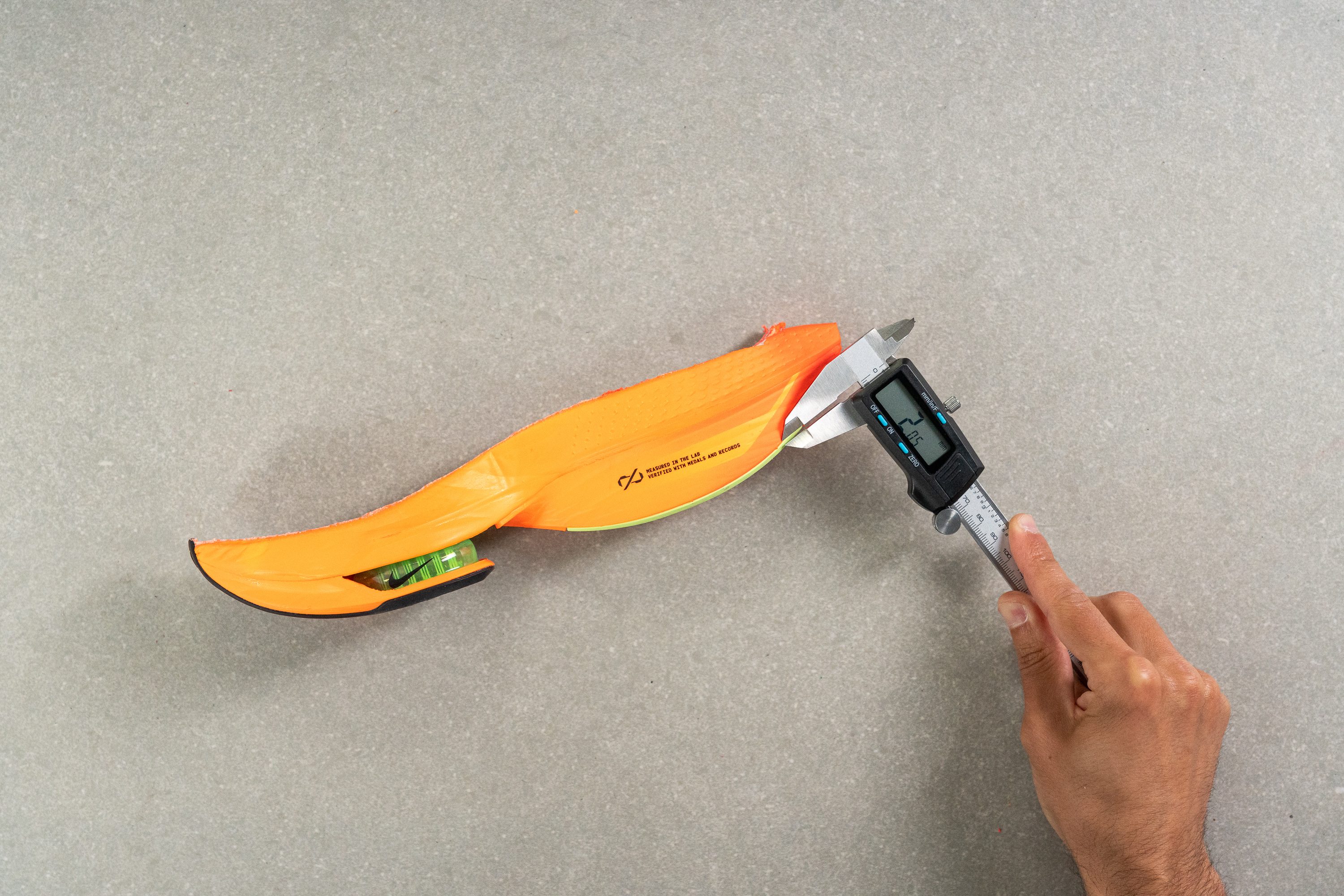
Nike has chosen to use a rubber that is 16.6% thicker than the one featured in their other top racing shoe, the Vaporfly Next% 2.
Of course, the Alphafly 2 will be durable in the racing shoe category. If you compare it with the average shoe, the outsole is 38% thinner and also 2% softer. But when you compare it directly with some competitors, the story is different. For instance, we measured the rubber in this Nike to be 31% harder than the one of the Metaspeed Sky, or 16% harder than the Adidas Adizero Adios Pro 2.
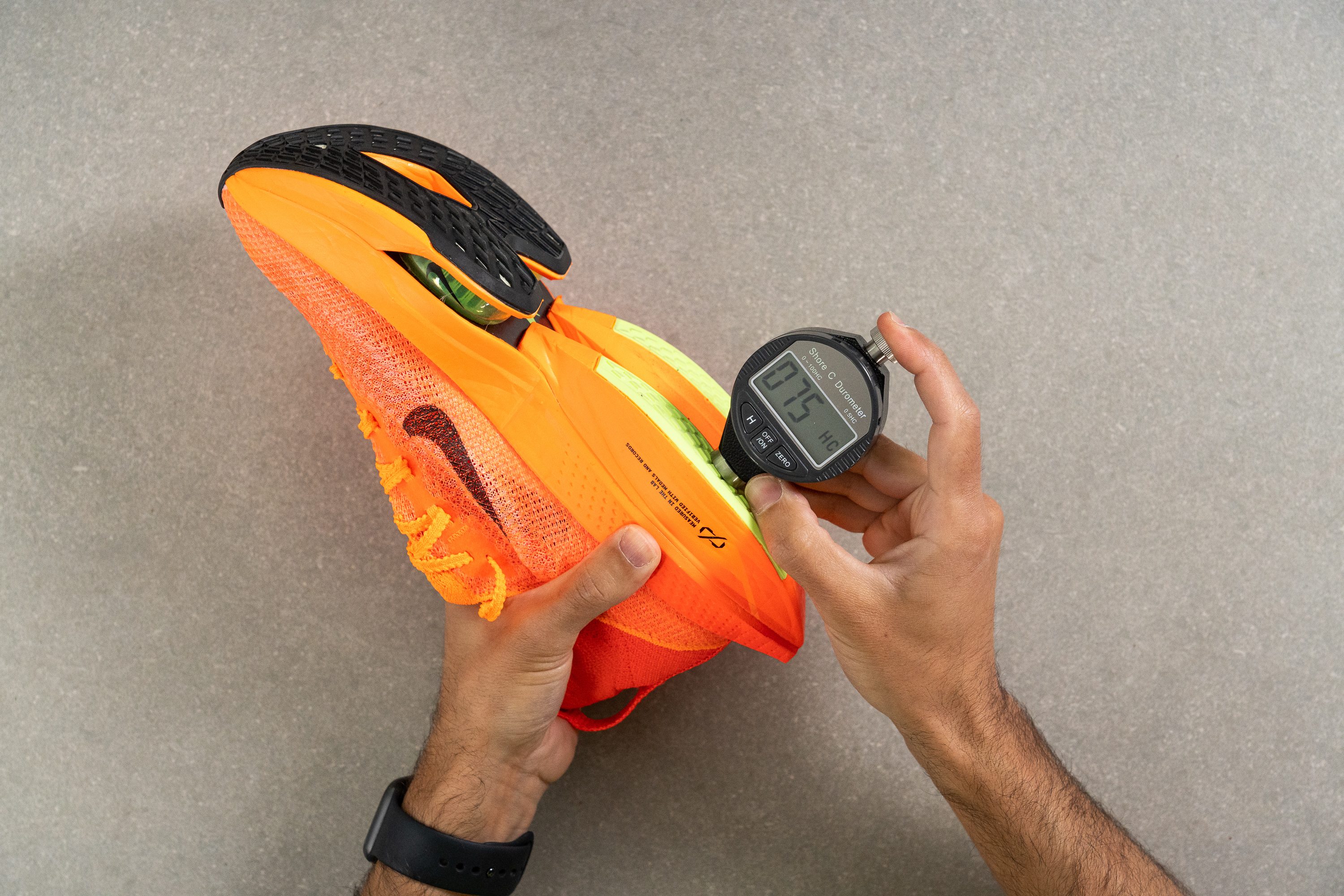
Not as noisy as before
The first iteration was rather noisy when landing the feet on the ground whereas this one is quieter and for sure less annoying. This improvement was a clever tactic from Nike: they included a thin layer of ZoomX foam under the Air Pods.
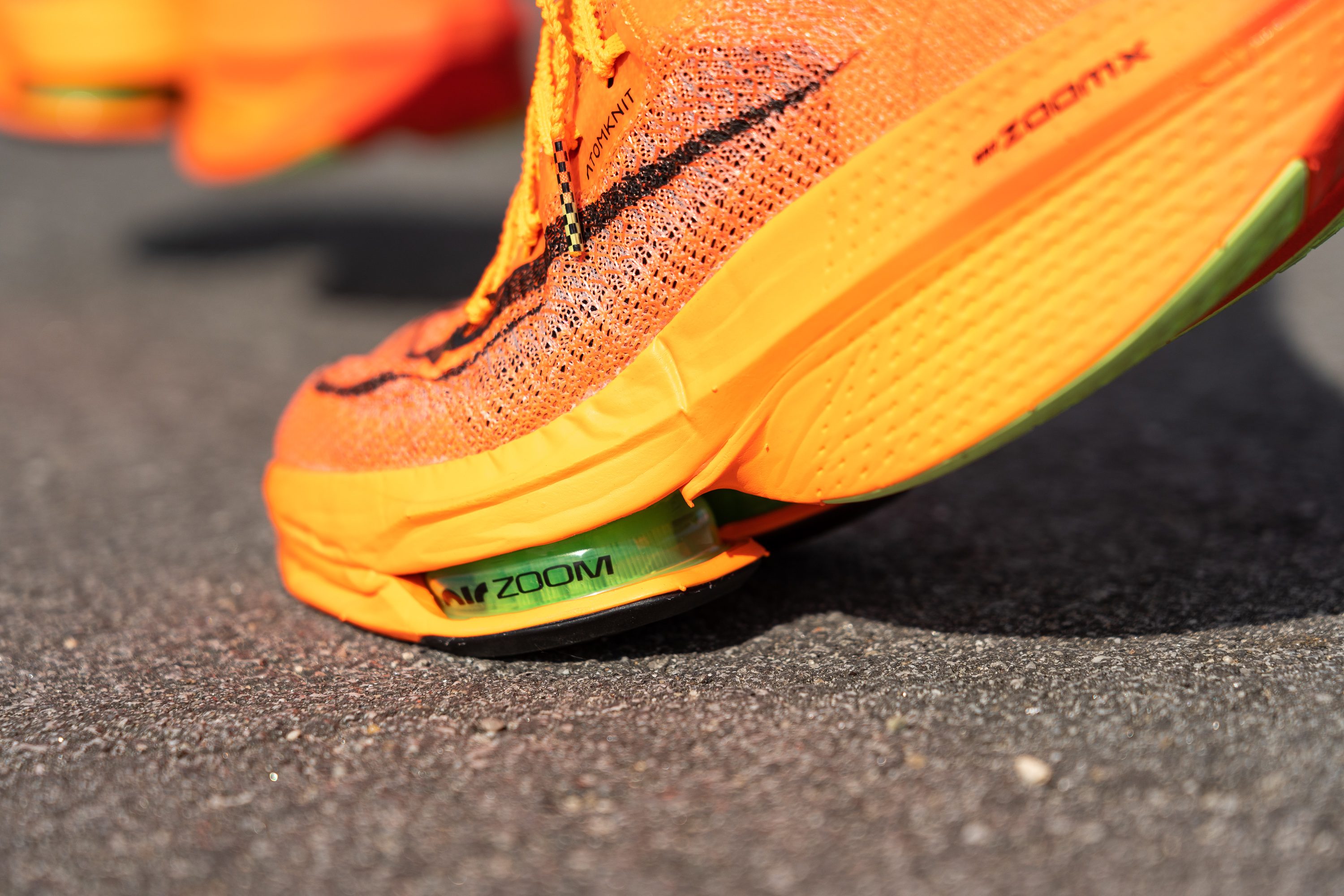
Grippier than v1
If with the first iteration, we experienced some slippage on slick asphalt. But version 2 sees an improved outsole that makes this shoe more reliable than before.
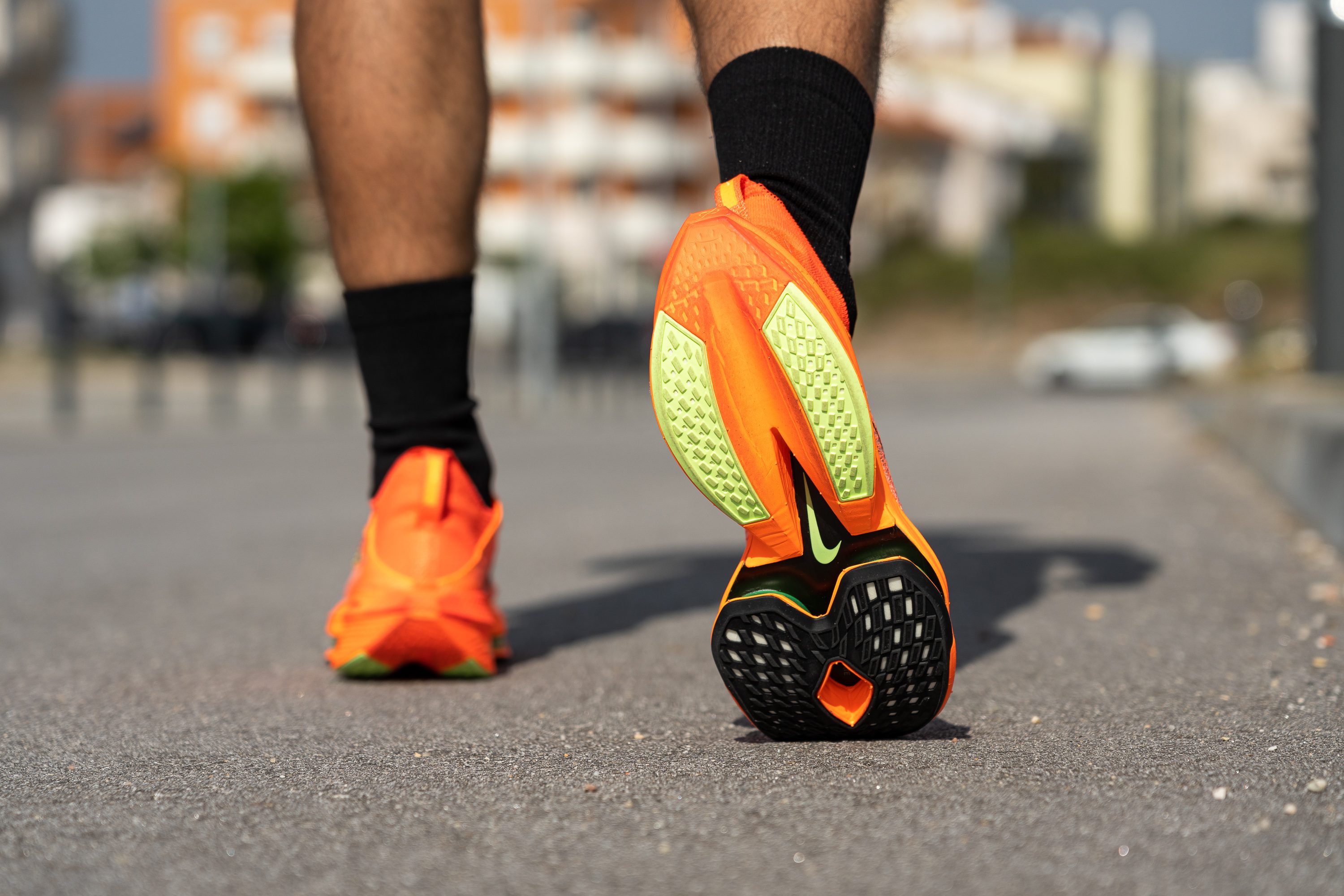
Paper-thin insole
Positioned above the insole and the strobel board, there is an incredibly thin insole, measuring just 1.8 mm. This makes it 59% thinner than the average shoe.
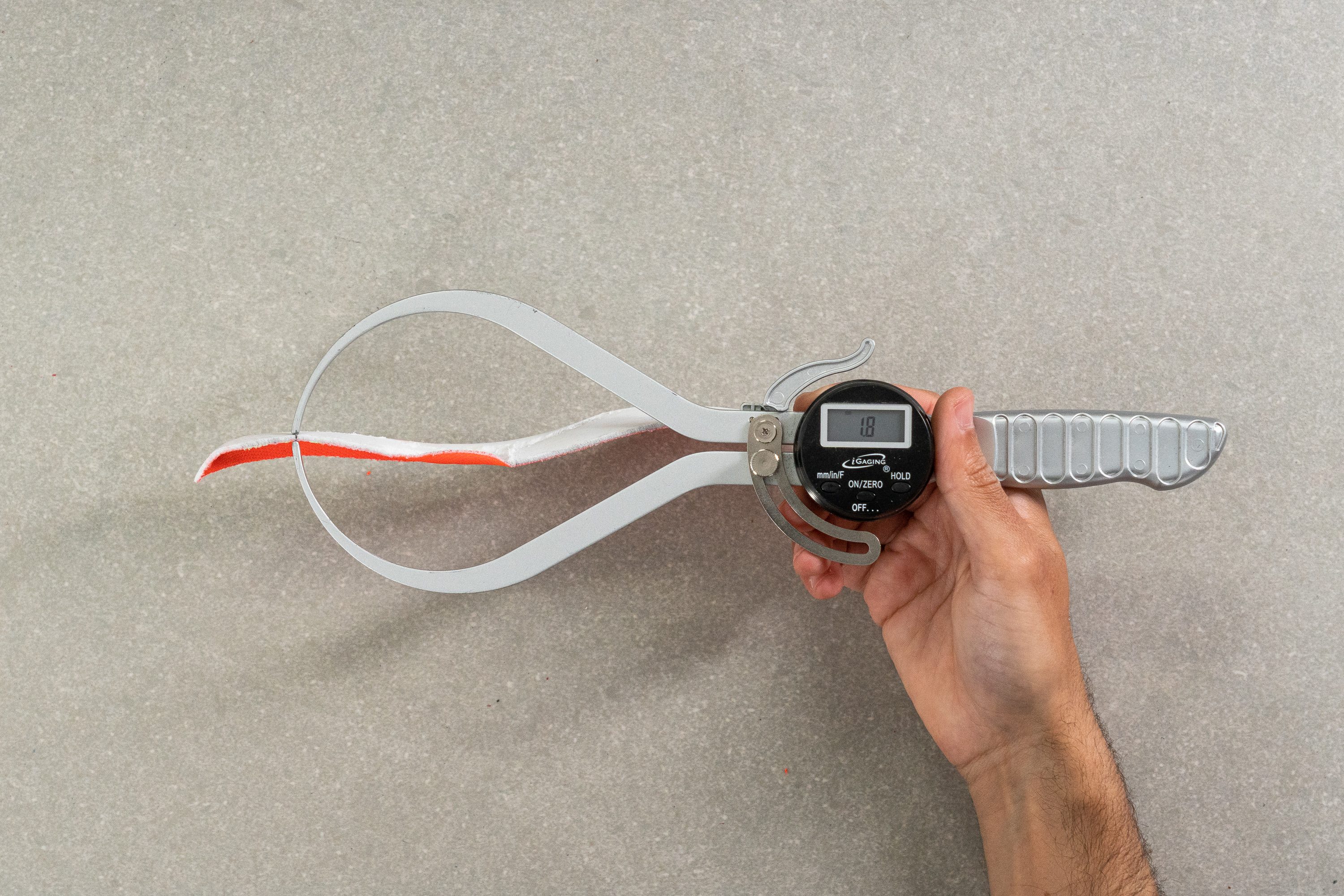
Definitely not for those on a budget
The price of $275 is well above the average for a competition running shoe ($206).
At least, for that price, you get the secure and spectacular notched laces that we would love to see in more super shoes.
